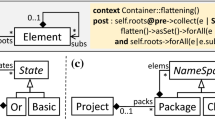Abstract
In object technology, reusability is achieved primarily through class inheritance. In model engineering, where reusability is also important, it should be possible to extend a modeling artifact in a similar manner to add new capabilities. This paper presents a conceptual and practical approach to model extensibility, in which new models are created as derivations from base models. There are several situations where such an extensibility mechanism is useful and essential (e.g., in the case of hierarchies of metamodels). In order to achieve the goal of model extension, a precise definition of the extension mechanism is needed, based on a strict model definition. After describing the context of model extension through a motivating example, the paper outlines a practical implementation with characterization of its main conceptual properties. The solution is being implemented as part of the AMMA model engineering platform under Eclipse.
Preview
Unable to display preview. Download preview PDF.
Similar content being viewed by others
References
Bézivin, J.: On the Unification Power of Models. Software and Systems Modeling 4(2), 171–188 (2005)
Del Fabro, M.D., Bézivin, J., Valduriez, P.: Weaving Models with the Eclipse AMW plugin. In: Eclipse Modeling Symposium, Eclipse Summit Europe 2006, Esslingen, Germany (2006)
D’Souza, D., Sane, A., Birchenough, A.: First-Class Extensibility for UML Packaging of Profiles, Stereotypes, Patterns. In: France, R.B., Rumpe, B. (eds.) UML ’99 - The Unified Modeling Language. Beyond the Standard. LNCS, vol. 1723, Springer, Heidelberg (1999)
Gitzel, R., Hildenbrand, T.: A taxonomy of Metamodel Hieriarchies, University of Mannheim (January 2005)
Jouault, F., Bézivin, J.: KM3: a DSL for Metamodel Specification. In: Gorrieri, R., Wehrheim, H. (eds.) FMOODS 2006. LNCS, vol. 4037, pp. 171–185. Springer, Heidelberg (2006)
Karsai, G., Maroti, M., Ledeczi, A., Gray, J., Sztipanovits, J.: Composition and Cloning in Modeling and Meta-Modeling Languages, IEEE Transactions on Control System Technology, special issue on Computer Automated Multi-Paradigm Modeling, 263–278 (March 2004)
Kurtev, I., Bézivin, J., Jouault, F., Valduriez, P.: Model-based DSL Frameworks. In: Companion to the 21st Annual ACM SIGPLAN Conference on Object-Oriented Programming, Systems, Languages, and Applications, OOPSLA, Portland, OR, USA (October 22-26, 2006), pp. 602–616 (2006)
Liskov, B., Wing, J.: A Behavioral Notion of Subtyping. ACM Transactions on Programming Languages and Systems 16(6), 1811–1841 (1994)
Mernik, M., Heering, J., Sloane, A.M.: When and how to develop domain-specific languages. ACM Comput. Surv. 37(4), 316–344 (2005)
Object Management Group: Unified Modeling Language: Infrastructure, version 2.1.1, formal/07-02-06, http://www.omg.org/cgi-bin/doc?formal/07-02-06
Pérez-Martínez, J.E.: Heavyweight extensions to the UML metamodel to describe the C3 architectural style. ACM SIGSOFT Software Engineering Notes 28(3), 5 (2003)
Peterson, J.: Petri Nets, ACM Computing Surveys, 223–252 (September 1977)
Rötschke, T.: Adding Pluggable Meta Models to FUJABA. In: 2nd International Fujaba Days, 2004, 04-253, Universität Paderborn, 57–61 (2004)
Turki, S., Soriano, T.: A SysML Extension for Bond Graphs Support ICTA’05. In: 5th International Conference on Technology and Automation, Thessaloniki, Greece, pp. 276–281 (October 2005)
Zito, A., Diskin, Z., Dingel, J.: Package Merge in UML 2: Practice vs. Theory?, Model Driven Engineering Languages and Systems, 185–199 (2006)
Zito, A., Dingel, J.: Modeling UML 2 Package Merge With Alloy. In: Proc. of the 1st Alloy Workshop (Alloy ’06). Portland, Oregon, USA (November 2006)
Author information
Authors and Affiliations
Editor information
Rights and permissions
Copyright information
© 2007 Springer Berlin Heidelberg
About this paper
Cite this paper
Barbero, M., Jouault, F., Gray, J., Bézivin, J. (2007). A Practical Approach to Model Extension. In: Akehurst, D.H., Vogel, R., Paige, R.F. (eds) Model Driven Architecture- Foundations and Applications. ECMDA-FA 2007. Lecture Notes in Computer Science, vol 4530. Springer, Berlin, Heidelberg. https://doi.org/10.1007/978-3-540-72901-3_3
Download citation
DOI: https://doi.org/10.1007/978-3-540-72901-3_3
Publisher Name: Springer, Berlin, Heidelberg
Print ISBN: 978-3-540-72900-6
Online ISBN: 978-3-540-72901-3
eBook Packages: Computer ScienceComputer Science (R0)




